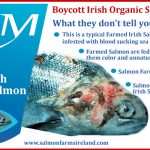Why I don’t eat smoked salmon (anymore) in my diet
Once upon a time, smoked salmon was not so present on our tables: it was eaten on special occasions, for example it was in great demand at Christmas. What has happened over the years? Due to its omega3 content, its low calorie content (about 170 calories per 100 g) and its protein content, salmon has become a sort of dietary passepartout. It is prescribed in every diet , considered safe, often favored by those who make an almost vegetarian scene, decreasing the consumption of meat in favor of fish. With the consequence that salmon is always present in supermarkets, at prices that are on average more affordable than they used to be, for its extension of the farms, which have led to a greater availability of the product. Despite being a lover of smoked salmon, a true lover since I ate it at least two / three times a week , after reading this article on slow food, I had to give it up.  Smoked salmon, even if only half of what Slow Food denounced is true, sucks. The breeding one, I mean, while more guarantees in theory there would be with the wild one. Do I recommend it in the diet? No. Is it safe food? No. _ Is it good? No. It’s bad for your health. And, if it continues to circulate without guarantees, not only is it not hygienic, but it poisons us.
Smoked salmon, even if only half of what Slow Food denounced is true, sucks. The breeding one, I mean, while more guarantees in theory there would be with the wild one. Do I recommend it in the diet? No. Is it safe food? No. _ Is it good? No. It’s bad for your health. And, if it continues to circulate without guarantees, not only is it not hygienic, but it poisons us.
Here are the few notions that I can summarize,I invite you to check the sources of what Slow Food says :
– the Nordic salmon farms do not have the same seriousness as the Italian ones: I know that we think of Northern Europe as at maximum efficiency, but in these farms the salmon live in very bad hygienic conditions are too many and the waters are not purified. The result? They grow and feed among stagnant waters, moss and excrements . The photo of a salmon living suffocated in its own excrement and attacked by various diseases is not beautiful. For anyone who has ever owned an aquarium, well, imagine half the space, with three times as many fish and no filter cleaning for a year.
– according to this research from the University of Bergen, smoked salmon is absolutely not recommended for pregnant women, children, and young people. This is because farmed salmon is polluted , not only by the filth of the waters, but also by toxins, including endosulfan, which was found to be ten times the permitted European limit.
Where are the controls? Norwegians are dissuading the consumption of smoked salmon, and that of farmed salmon.
Are there any exceptions? Unfortunately, wild / wild salmon is less available, and nothing prevents the producer from calling a farmed salmon wild. Also because, as can be seen from this articleor, the life of salmon is increasingly difficult, while poorly managed farms fed with animal meal abound and risk negatively affecting not only this species, but precisely in terms of environmental impact.





























+ There are no comments
Add yours